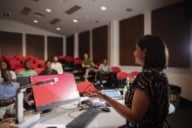You have /5 articles left.
Sign up for a free account or log in.

Wikimedia Commons
COVID-19 has upended so many academic norms. Now Youngstown State University may be poised to turn another tradition on its head: faculty ownership of textbooks, articles and other nonpatentable works.
According to documents from the university’s ongoing contract negotiations with its faculty union, Youngstown State wants to fundamentally change how it defines scholarship, copyright, intellectual property, distance education and the legal term "works for hire." It also wants to introduce the concept of commercialization into the faculty contract.
The current faculty contract, for example, defines works for hire as “university-commissioned projects whereby a faculty member and the university knowingly and voluntarily [enter] into a written agreement to create a specific intellectual property; such efforts are not in fulfillment of the faculty member’s normal duties and responsibilities.”
Under this definition, works for hire, or nonpatentable works created within the scope of employment -- think books, textbooks, articles and even lectures and syllabi -- are the intellectual property of their faculty creators. This is in line with how colleges and universities almost always treat the works-for-hire doctrine of U.S. copyright law. Institutions could legally claim authorship and copyright ownership over faculty-penned books, articles and course content, but they don’t.
By contrast, many other kinds of employers automatically assume authorship and ownership of their employees' work.
Academe’s treatment of the works-for-hire doctrine is technically just a tradition wrapped up in academic freedom, but it’s a strong one. And while universities may lose out on collecting royalties from the books their professors write, they do stand to benefit from any publicity and prestige these books attract. Many faculty members also view their ability to write and own books as a form of compensation, or a potential supplement to their salaries.
In a significant departure from that tradition, Youngstown State wants to change the contractual definition of works for hire so that it owns all nonpatentable faculty work.
Another proposed amendment to the contract adds commercialization to the mix, defining it as the “process of developing and delivering new ideas, products or services to market.” The process can include anything from creation of intellectual property to licensing and selling it.
Union leaders declined to be interviewed about the contract, citing a media blackout during stalled negotiations and a forthcoming fact-finders’ report. But internally these faculty members have warned their colleagues that the university wants to seize all rights to faculty intellectual property, including the commercialization of that property, by claiming all scholarship prepared by an employee as a work for hire.
Even textbooks voluntarily written by faculty but included in their promotion dossier would be considered property of the university -- unless it could be proven the book was written when the faculty member was not covered by an employment contract, the union has warned.
In subsequent conversations about the proposal, faculty members have asked each other how it might change incentive structures for creating scholarship. If professors write some popular books to supplement their salaries, for example, might they stop writing these books if they no longer own the rights?
Ron Cole, university spokesperson, said via email that the administration is not changing its formal policies surrounding intellectual property, but he declined to answer specific questions about contract negotiations.
In general, he said, the university “always has as a goal to be consistent with state and federal law as we are a state university. The definitions contained in some of our agreements are currently contrary to long standing legal definitions set forth in the copyright law and have an adverse effect on our ability to interpret and apply the law. The primary goal of these language changes is to be consistent with the law.”
Regarding lectures, syllabi and other materials created for “ordinary teaching,” Cole said Youngstown State has traditionally viewed them as owned by the faculty, and will continue to do so. Cole added, “Unfortunately, we cannot say more except to state confidently that the administration’s proposed clarifying changes will not negatively affect the faculty, staff or students.”
The university’s public statement does little to erase faculty doubts, for now. It’s clear that the university is in a difficult spot financially, and some professors suspect that Youngstown State is trying to find revenue and slash its budget wherever it can -- whatever that means for employee morale. Already this year the university said it is cutting 22 athletics positions and furloughing, laying off and cutting pay for many other service, classified and administrative employees. The university attributes the cuts to the pandemic, or nearly $3 million in student fee refunds and several million in state funding cuts already.
The National Education Association-affiliated faculty union has warned that the new faculty contract may include other bad news for professors, including salary cuts, increased health-care costs and decreased benefits, workload increases, and a force majeure clause threatening fulfillment of the contract in case of an extraordinary event.
Mark Vopat, professor of philosophy at Youngstown State and a spokesperson for the union, said that before the coronavirus pandemic, professors who wanted to teach an online course either designed these classes themselves and retained ownership, or created a course specifically for and approved by the university's distance learning program. In the latter case, professors design a class, teach it at least once for $2,000 and retain the right of first refusal to teach it again. And so this describes a work-for-hire scenario that is more typical of nonacademic employers.
Faculty advocacy organizations have been warning since March that putting courses online en masse due to the pandemic poses a risk to academic intellectual property traditions. The fear is that universities will claim ownership of course content when it's neatly uploaded onto learning management systems the universities pay for, as the temptation will be too great for them to resist. Implicit are the secondary fears that faculty members may be replaced with less experienced instructors who will simply administer those courses in the future, and that institutions will circumvent faculty governance structures and try to offer more online courses to make money.
In a related matter, faculty members at Youngstown State say the university is moving toward using more external graders, or teaching assistants, to oversee extra course sections, instead of paying professors overload rates to teach extra sections or hiring adjuncts.
Chris Sprigman, a professor of law specializing in copyright law and intellectual property at New York University, said it was impossible to know just how Youngstown State's new property definitions would be applied without seeing the full, underlying contract. But he said the definitions on their own are potentially worrisome, in that they leave room for “mischief.”
“There’s definitely smoke,” he said.
If institutions start to assert ownership over own faculty articles, for instance, Sprigman continued, that could upset the trend toward open-access publishing, with colleges and universities cutting deals with academic publishers and thinking “more like copyright owners and less like stewards of knowledge.”
Similarly, professors who write books for the broader public, acting as bridge between academe and society, may cease doing so when the royalty incentive is removed from equation, he said.
Sprigman noted that institutions interested in using their faculty members’ online course work, in particular, are free to attempt to negotiate licensing agreements with them.
Any broader “grab” of faculty intellectual property rights, he cautioned, “would be such a shift in the relationship between American universities and their faculty that I've got to believe it would spark a lot of resistance.”









